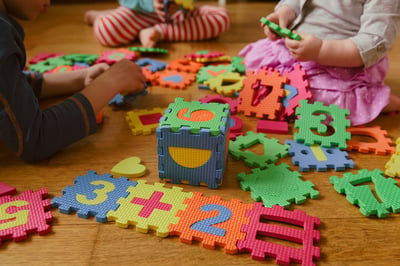Puzzles can be the perfect toy for preschoolers: not only are they fun, but they also help in their development in numerous ways. In fact, Empowered Parents lists more than a dozen of them!
The Many Ways Preschool Puzzles Help Children Learn
Help Enhance Visual Perception & Memory
Besides helping young children to work on their gross and fine motor skills, preschool puzzles help them to develop their visual perception. As children see shapes, forms, and images on individual puzzle pieces, their brains interpret them to allow the youngsters to put the pieces together in the right way.
What they learn through this process helps them to build visual memory (remembering what they saw), visual discrimination (understanding how the pieces are similar or different), comprehension, and much more. They can recognize patterns and put them together, which involves the skills of analysis and synthesis, and they can identify objects by seeing parts of them on a puzzle piece. Altogether, these skills help with early literacy, which forms the basis of both reading and writing.
Develop Attention Span & Problem-Solving Skills
Preschool puzzles can also help your child to develop their attention span. Once a puzzle grabs their attention, it helps them to focus because there is an end point that needs to be reached to enjoy a sense of achievement. Compare this to other games and activities where a preschooler can stop at any time, and you can see how preschool puzzles can serve as motivation to just keep going.
An Australian childcare resource notes how it’s important to provide your young child with puzzles that fit with their abilities. In other words, don’t start with a 5,000-piece puzzle that would overly frustrate them! When you right-size the challenges associated with the puzzle, the process can help your child to learn how to overcome problems and deal with frustration in developmentally appropriate ways.

Build Self Confidence & Sense of Satisfaction
Still other benefits include the formation of self-esteem as the young child finds solutions to put the puzzle together, gaining self confidence as they succeed. Preschool puzzles can take some effort, and children can discover how good it feels to stick to a quest and complete it well. 
Puzzles are excellent activities for a child to perform alone, and they can also be an activity that they do with someone else, making this an opportunity to socialize. When doing a puzzle with a sibling or friend, they can practice sharing, communicating, and cooperating. When they have a solution, they can share it with the puzzle partner, and they can also feel satisfaction when the other person finds a sought-after location for a puzzle piece.
Horizon Education Center’s Preschool Programs
Working on puzzles is just one of the fun activities that children can enjoy in our preschool programming. Horizon focuses on kindergarten readiness as we provide activities that enhance literacy skills, verbal and social skills, and number and letter recognition. We also provide developmental screenings and assessments while providing educational experiences that will last for a lifetime—and we invite you to explore any of our quality education centers today!



